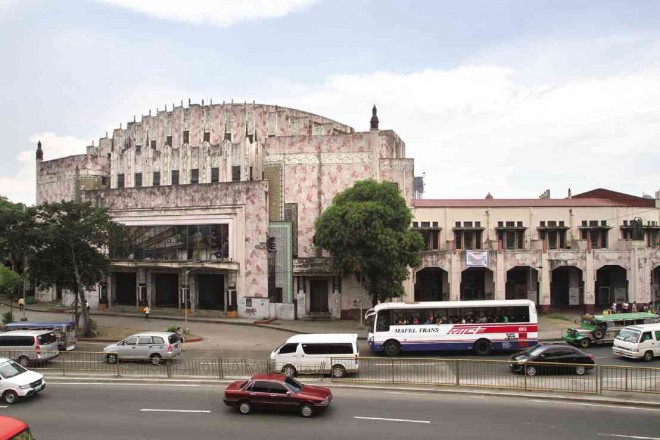
The Met is up for “a new glorious era,” says the NCCA, whose tough task starts with removing grime and graffiti from its historical marker (photo below). Photos by Richard Reyes
Now in her mid-80s, the “Grand Dame” will rock and regale the people once again.
It will require about two years of restoration work. But once reopened, the historic Manila Metropolitan Theater will focus on hosting events and performances appealing and affordable to the general public.
This is the vision spelled out by the National Commission for Culture and the Arts (NCCA) as it gained ownership of The Met after buying the 1931 Art Deco structure from the Government Service Insurance System (GSIS) for P270 million.
NCCA chair Felipe de Leon said the Met could “complement” the Cultural Center of the Philippines. “Right now, the CCP hosts many high-end performances. The Met, meanwhile, will be the people’s theater, a theater for the masses,” De Leon told reporters on Wednesday during the signing of the deed of sale and the turnover of titles from the GSIS to the NCCA. Also present was GSIS president and general manager Robert Vergara.
The theater, a 7,533-square meter property in the central Manila area of Arroceros, will host a broad range of events, from musicals and plays to exhibits and fairs, many of them free of charge, De Leon added.
“We’ll try to have as many free shows as possible. The plays, musicales, exhibits and other events The Met will host will definitely be attuned to the needs and tastes of the general public.”
Among the beneficiaries of the theater’s revival would be the Pamantasan ng Lungsod ng Maynila (PLM) and Universidad de Manila (UDM), which are both run by the Manila city government.
“We will let (PLM and UDM) students use the theater as much as possible. We will also open an Institute of Performing Arts at the theater, which will offer courses in theater, drama, film and music, among others,” De Leon said.
Other major concerns to make The Met attractive again to the public—such as managing traffic and offering enough parking space in that part of Manila—will also be addressed, he added.
New glory won’t be cheap
“This is a very touching, historical occasion and milestone,” he said in a speech at Wednesday’s turnover rites. “The Met is one of the best and most creative products of Filipino artistic excellence, an important icon of Filipino culture, and a significant part of our cultural history. I hope this is the beginning of a new glorious era for Manila.”
But regaining that glory will not come cheap. “We estimate the restoration to cost at least another P270 million because the theater is badly damaged. We are going to ask engineers and other experts to look into The Met’s condition as soon as possible so we could start the bidding process for the restoration.”
The funds will come from the agency’s National Endowment Fund for Culture and the Arts (NEFCA).
Designed by architect Juan Arellano, the 1,600-seat theater was opened in 1931 and served as a cultural venue mainly for the elite. Damaged during World War II, it went into several transformations as a boxing arena, a cheap motel, a garage and a warehouse. At one point, some 50 homeless families took shelter there.
In the 1970s, then First Lady Imelda Marcos rebuilt the theater but it again fell into neglect after the 1986 Edsa Revolution. It was again closed in 1996 due an ownership dispute between the GSIS and the city government.
Last year, Manila Mayor Joseph Estrada expressed his intention to buy it back from the GSIS. City Hall offered to pay P35,000 per square meter or P267.155 million.
But the NCCA, exercising its right to fend off buyers of national cultural treasures, intervened and matched the city government’s offer. For the purchase, it drew P270 million also from the NEFCA, as authorized by Budget Secretary Florencio Abad.–With Inquirer Research
RELATED STORIES
Good news for Metropolitan Theater; bad news for Coca-Cola plant
The resurrection of the Met: Is it happening–finally?